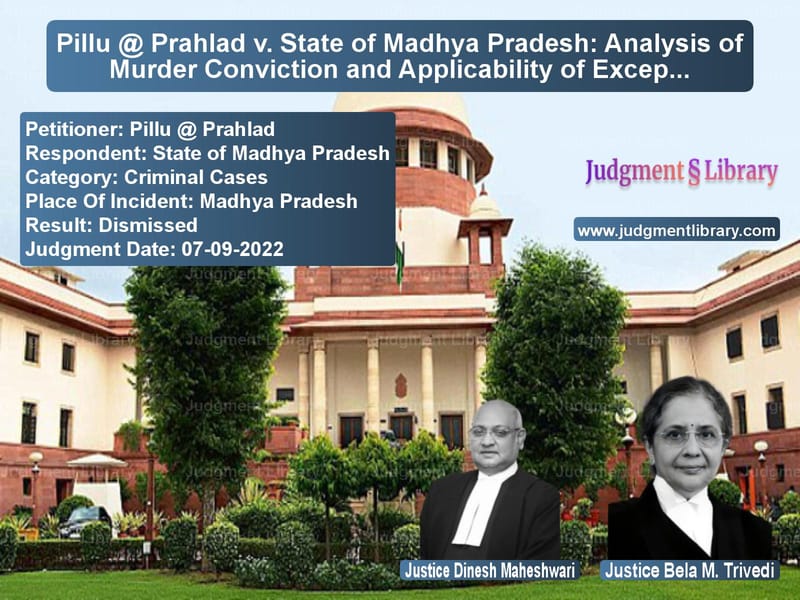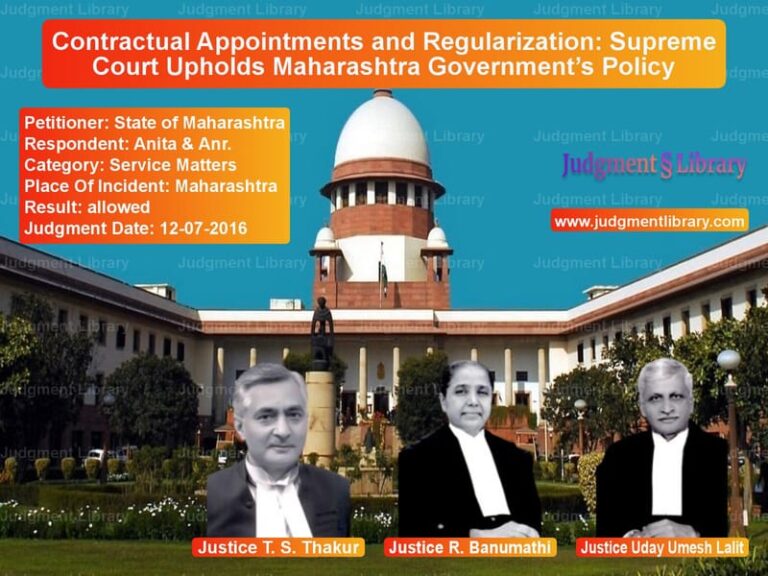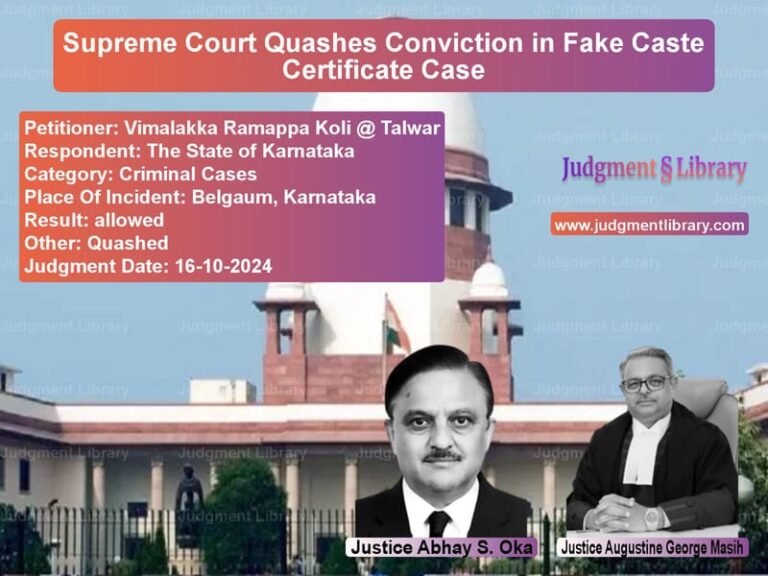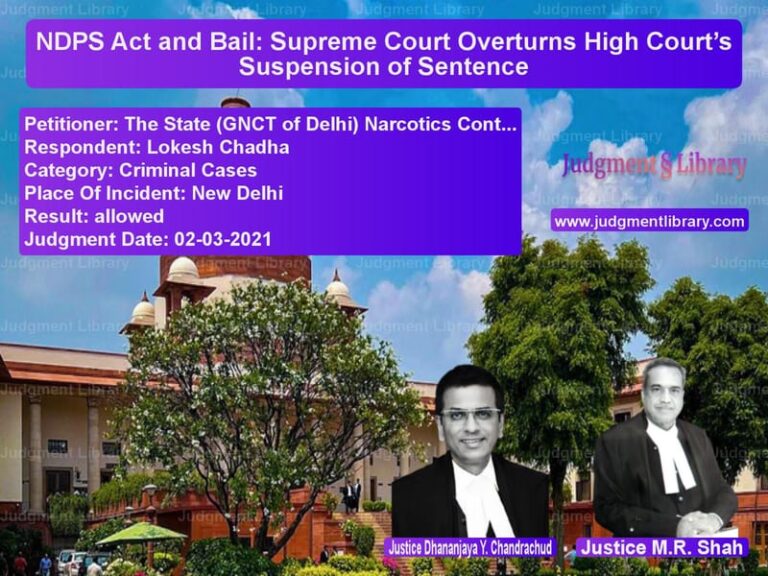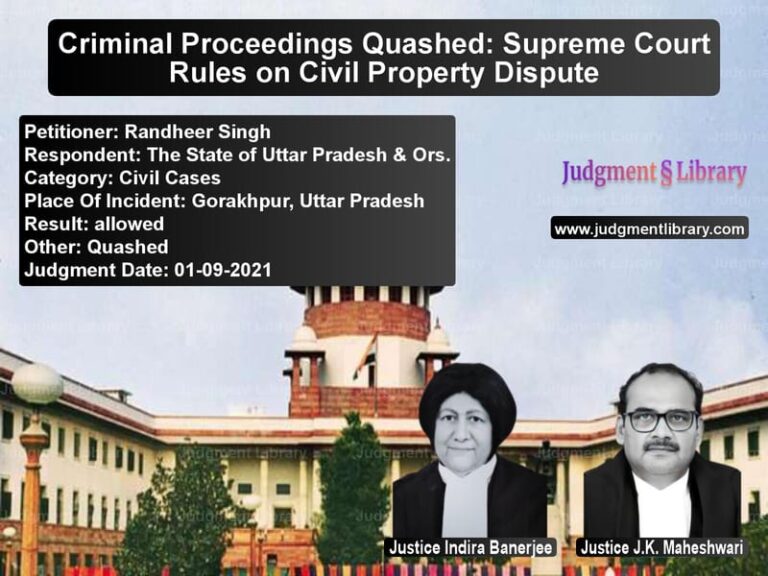Pillu @ Prahlad v. State of Madhya Pradesh: Analysis of Murder Conviction and Applicability of Exception 4 to Section 300 IPC
The case of Pillu @ Prahlad versus the State of Madhya Pradesh involves a legal challenge by the appellants, Pillu and others, against their conviction under Section 302/34 of the Indian Penal Code (IPC) for the murder of Sanju. The appellants were initially convicted by the Trial Court, and their appeal to the High Court of Madhya Pradesh was dismissed, leading to the present criminal appeals before the Supreme Court of India. This judgment examines the critical legal issues surrounding the conviction, the application of Exception 4 to Section 300 IPC, and the evidentiary value of the prosecution’s key witnesses.
The appellants argue that the conviction for murder under Section 302 IPC should be reconsidered and converted to culpable homicide not amounting to murder under Section 304 IPC, citing the application of Exception 4 to Section 300 IPC. Exception 4 states that culpable homicide is not murder if the act is done without premeditation in a sudden fight and without the intention to cause death. The appellants contend that the incident, which led to the victim’s death, occurred during a quarrel, and there was no prior intention to kill the victim. They also argue that the witnesses for the prosecution, particularly PW-1 (Shankerlal) and PW-11 (Rameshwar Prasad), were unreliable and inconsistent, weakening the case against them.
The appellants’ counsel, in their submissions, focused on the character of the incident, stressing that the quarrel was spontaneous and unplanned, thus falling within the ambit of Exception 4. They referred to the Supreme Court’s judgment in Pulicherla Nagaraju Alias Nagaraja Reddy v. State of A.P., which dealt with determining whether an offence constituted murder or culpable homicide not amounting to murder. In this case, the Court emphasized the need to carefully evaluate the intention behind the act, especially in situations involving sudden quarrels or fights. The appellants’ counsel argued that the incident was not premeditated and should, therefore, be classified under Section 304 IPC instead of Section 302 IPC.
The prosecution, represented by the State of Madhya Pradesh, strongly opposed the appellants’ contentions, asserting that the incident was not a case of sudden fight but rather a planned attack. The prosecution argued that the appellants had a clear intention to kill the victim, which was evident from the nature and extent of the injuries inflicted. The prosecution’s case was based on the testimonies of witnesses, particularly PW-1, who was the first informant in the case, and PW-11, who allegedly witnessed the incident. The prosecution contended that the appellants had assaulted the victim in a planned manner, particularly in an effort to pressure the victim to refrain from giving evidence in another criminal case.
The High Court, after reviewing the case, upheld the Trial Court’s decision, finding the appellants guilty under Section 302/34 IPC, maintaining their life imprisonment sentence with a fine. The High Court dismissed the appellants’ argument regarding the applicability of Exception 4, stating that the circumstances of the case did not support the claim of a sudden fight. The Court found that the appellants had deliberately planned the attack, and the injuries sustained by the victim, including stab wounds and incise wounds to vital areas like the skull and chest, indicated that the intention to cause death was present.
On appeal to the Supreme Court, the appellants’ counsel again sought to argue the case under Exception 4 to Section 300 IPC, but the Court found no merit in their submissions. The Court reiterated the importance of intention in determining whether the case falls under Section 302 or Section 304 of the IPC. It noted that while minor provocations may lead to sudden altercations, the level of violence and the nature of the injuries inflicted on the victim in this case suggested an intent to cause death. The Court observed that the appellants had used a weapon to inflict multiple stab wounds and incise wounds, which were considered to be deliberate acts intended to cause death.
The Supreme Court also examined the evidentiary value of the testimonies of PW-1 and PW-11. The appellants argued that PW-1, the first informant, was declared hostile during the trial, which raised doubts about the credibility of the prosecution’s case. PW-11, the key eyewitness, was introduced 22 days after the FIR was lodged, and the appellants’ counsel argued that this delayed introduction made his testimony unreliable. However, the Supreme Court upheld the findings of the Trial Court and the High Court, stating that both the Trial and High Courts had thoroughly examined the credibility of the witnesses and had reasonably concluded that the appellants were guilty. The Court also found no substantial grounds to overturn the conviction based on the argument of the unreliable testimony of the witnesses.
Read also: https://judgmentlibrary.com/supreme-court-acquits-two-trade-union-leaders-in-assam-murder-case/
The Supreme Court dismissed the appeals, affirming the appellants’ conviction under Section 302/34 IPC and the life imprisonment sentence with a fine. The Court also noted that the applicability of Exception 4 to Section 300 IPC was not supported by the facts of the case, as the nature of the injuries and the circumstances surrounding the incident suggested premeditation and intent to cause death. The Court emphasized the need to carefully assess the intention behind an act of violence, especially in cases where the charge is murder, and concluded that the appellants’ actions fell squarely within the definition of murder as per Section 302 IPC.
The judgment in this case highlights several important principles related to criminal law, particularly regarding the classification of homicide and the importance of intention in determining the severity of the offense. The case also underscores the role of witness credibility in criminal trials and the careful evaluation of all evidence before determining guilt. It reinforces the principle that murder charges should not be reduced to culpable homicide unless there is clear evidence of a lack of intent to cause death or premeditation.
Overall, the judgment in Pillu @ Prahlad v. State of Madhya Pradesh serves as an important reminder of the need for careful and comprehensive analysis in cases of homicide, particularly when it comes to determining intent and evaluating witness testimony.
Petitioner Name: Pillu @ Prahlad.Respondent Name: State of Madhya Pradesh.Judgment By: Justice Dinesh Maheshwari, Justice Bela M. Trivedi.Place Of Incident: Madhya Pradesh.Judgment Date: 07-09-2022.
Don’t miss out on the full details! Download the complete judgment in PDF format below and gain valuable insights instantly!
Download Judgment: pillu-@-prahlad-vs-state-of-madhya-prad-supreme-court-of-india-judgment-dated-07-09-2022.pdf
Directly Download Judgment: Directly download this Judgment
See all petitions in Murder Cases
See all petitions in Contract Disputes
See all petitions in Damages and Compensation
See all petitions in Public Interest Litigation
See all petitions in Judgment by Dinesh Maheshwari
See all petitions in Judgment by Bela M. Trivedi
See all petitions in dismissed
See all petitions in supreme court of India judgments September 2022
See all petitions in 2022 judgments
See all posts in Criminal Cases Category
See all allowed petitions in Criminal Cases Category
See all Dismissed petitions in Criminal Cases Category
See all partially allowed petitions in Criminal Cases Category

